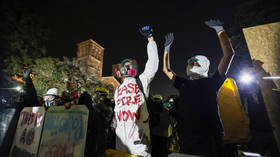‘Spoofing’ Isn’t the Biggest Manipulation Going On, but These Prosecutions Are a Start
by Chris Powell, Money Metals:

Delighted as we all may be with this week’s news – the new indictments of JPMorganChase employees involved with the gold market, the U.S. Justice Department’s designation of the investment bank as a criminal enterprise, and the prospects of more indictments – we have to admit a couple of things about the situation.
First, the market manipulation of which the bank’s employees and supervisors stand accused – rigging prices largely by “spoofing” other traders – is not the sort of manipulation the Gold Anti-Trust Action Committee (GATA) long has complained about.
This week, a reporter for a mainstream financial news organization on whose door I have pounded relentlessly without result actually sought comment about the indictments from me.
But I had to disappoint him and maybe even to offend him with this:
“Of course, the Morgan traders charged today enjoy the presumption of innocence. But the Justice Department already has obtained confessions from and convictions of two former Morgan traders who say they manipulated the monetary metals markets with the approval of their supervisors. So there is already documentation of systemic corruption in the monetary metals markets and at the country’s biggest investment bank.
“Unfortunately the involvement of the U.S. government itself in similar market rigging remains unaddressed.
“Such rigging seems comprehensive and a matter of longstanding policy, of far greater impact than the sporadic rigging attributed to the traders for Morgan and other banks.
“A year ago, echoing GATA, U.S. Rep. Alex X. Mooney, R-West Virginia, asked the Treasury Department to identify the markets in which the U.S. government is trading secretly and to explain the purposes of such trading. The department has refused to respond.
“Also echoing GATA, last year Mooney asked the Commodity Futures Trading Commission whether it has jurisdiction over manipulative trading undertaken by or on behalf of the U.S. government or whether such trading is legal, authorized by the Gold Reserve Act of 1934 or other federal laws, and the commission also has refused to respond. We urge financial news organizations to press those bigger questions.”
In November 2001 in U.S. District Court in Boston, we heard an official answer to the question now pending with the CFTC.
The case before the court was Reg Howe’s lawsuit against the Bank for International Settlements, the Treasury Department, the Federal Reserve, and various bullion banks, accusing them of rigging the gold market.
An assistant U.S. attorney moved for summary judgment dismissal of the lawsuit, telling the court that while the government was not admitting what Howe charged, the government did claim the power, under the Gold Reserve Act of 1934, to do exactly what Howe charged.
As this week’s news reports have shown, putting critical questions to central banks about their surreptitious interventions in the gold market and other markets remains prohibited in mainstream financial news organizations.
That intervention constitutes far greater manipulation of markets than JPMorganChase is capable of on its own and indeed reflects government policy to suppress not just the price of gold but the prices of all major commodities.
Inadequate as the resulting reporting was, at least it showed that the mainstream financial news organizations know who we are and where to find us. It also suggested that those organizations may be starting to feel a bit nervous about having neglected the manipulation issue for so long.
The other thing we must admit is that we’re puzzled by the Justice Department’s aggressive pursuit of JPMorganChase.
Yes, in their Tuesday commentary Pam and Russ Martens of Wall Street on Parade wonderfully detailed the last decade of proven criminality at the bank.
But for many years JPMorganChase has been essentially a government agency itself – not just a primary dealer in U.S. Treasury securities but a broker for the government in various undertakings and rescues.
The bank almost certainly has helped to execute the government’s surreptitious trades in the commodity futures markets.
After all, the bank’s chief executive officer, Jamie Dimon, and the former chief of its commodity division, Blythe Masters, have stated publicly that the bank has no position of its own in the monetary metals markets and trades them only for “clients.”
Loading...



